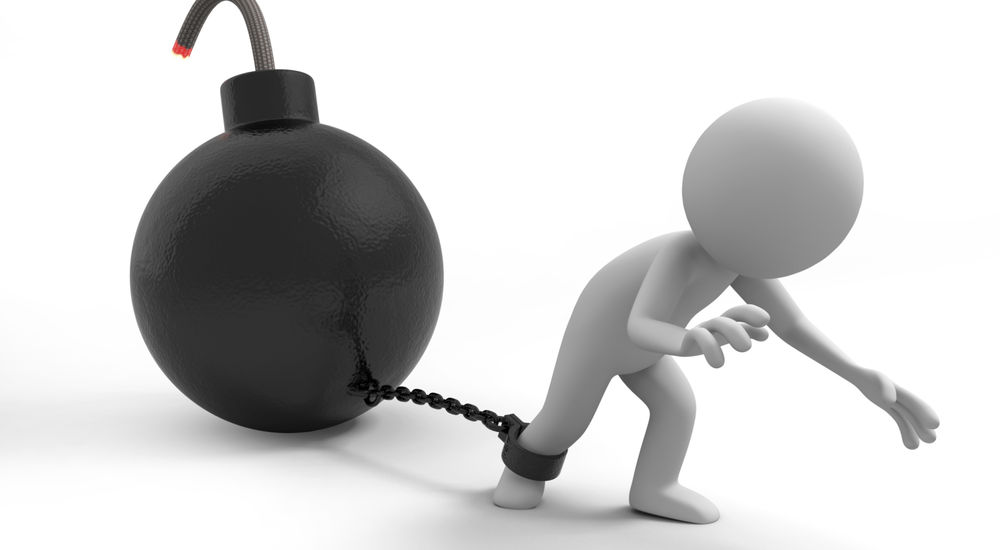Self-Sabotage and 'self-destructive' syndrome
"You can't do it!", "It's too hard to do it", "Even if you try, you will fail" . These sentences sound like they are comes from a bad, evil person and always wants to bury others. However, the reality is that very often, we ourselves are the bad guys and our goal is to destroy ourselves!
This is a good example of a self-sabotage syndrome . In addition, this syndrome can be expressed through other common behaviors such as procrastination, self-medication (self-medication, a doctor's prescription) using substances stimulation or alcohol, "emotional eating " (comfort eating - only those who eat to make me feel happier than to satisfy hunger and the forms of self-injury) like cutting knives or using dangerous drugs . Although these behaviors can help a person feel better at a certain time but eventually, they will ruin them, especially if continuous repeat.

On Psychology Today - a website that is famous for its in-depth psychological articles, analysis and research has led to the fact that self-sabotage syndrome is as follows:
People do not always recognize their own self-destructive behavior because these effects often do not appear continuously. In addition, even listing a series of failures that self-inflicted if you do something cannot stop them from committing these mistakes.
The self-talk conversation ( Self-talk ) in a negative way is a habit that many people have and if you do not change, it is these thoughts that will prevent you from achieving your goals and dreams. mine.
Worse, we often don't realize this danger is happening. Instead, we blame ourselves for not succeeding with inadequacy, incomplete, inadequate. Gradually, those negative messages are ingrained in each person's soul, causing us to fall into a whirlwind of self-destruct which is extremely difficult to escape.
Another obvious sign of your self-destruction is that you slowly stop even though you are trying to achieve your goal without a good reason. Your skills, abilities and desires, you have enough, just that something appears that is preventing you from moving forward without even knowing what it is.
When you feel you can't do what you should or should not do even though deep down, you want or need to do it, it's "self-sabotage" that controls you.
Here are some common manifestations of self-destructive syndrome.
Procrastination
- Knowing that you should do something, but you keep procrastinating.
- Start projects but never completed them.
- Feeling unmotivated or unable to continue, even if there are many great opportunities appear.
- Dreams cannot come true
- The dream of having something but not doing anything to get it.
Worry
- Worrying about something is not really important.
- Afraid that if you fail, you will not be respected by others.
- Worried that if successful, friends will no longer "like" themselves.
- Suspect yourself and your ability even though you "know" you are capable.
- Feel stressed, anxious and frustrated without understanding the reason for trying to do something important to you.
Angry
- Using words / actions is more offensive than assertive and does not show signs of change.
- Destroy relationships with other people (family, friends, colleagues) with anger, resentment or jealousy.
Feel useless
- Exaggerate and exaggerate the achievements of others but lower the value of what you achieve.
- Obsessed by unfair or false criticism.
- Let others down, bury you.

Whatever your self-destructive behavior is, you MUST pass them if you want to change your life in a better way. If your mind is overwhelmed by conversations that tell you full of negative thoughts, you will ruin your confidence and self-esteem. And every time you fail, you "prove" yourself that you can't or shouldn't do what you want.
And if you keep going down like that, you will become more frustrated, frustrated and angry with yourself. These emotions will trap you and prevent you from doing anything you need to do to be liberated.
However, you can still "save yourself".
Break the spiral of self-destruction
1. Recognize your self-destructive behavior
To be able to stop self-destructing, you need to first realize your own self-destructive behaviors. Ask yourself:
- What goals have you set for yourself for a long time but have you never done it?
- Do you constantly fail to do something without a clear cause?
- What do you feel you often delay or can't make decisions in?
- Do you often lose motivation when doing what you want to do?
- Do you find yourself angry or unreasonably angry, and does that affect your relationships?
- Is there a situation where others (especially bosses) constantly scold you?
- Is there anything in your life that strikes you, making you feel dissatisfied because you know you can do it or do it better?
Ask yourself such questions to find situations where you find yourself ruining yourself.
2. Control negative thoughts
Think about things that you often say to yourself. Write down those negative thoughts, no matter how silly or crazy they are.
Tip:
The ideal time to do this is when you are telling yourself. At such times, control the "flow of awareness" and write down all negative statements that appear in that head.
Alternatively, you can apply visualization : create a situation in your head that you can experience those unconscious thoughts or recall what you thought was the last time it happened.

3. The challenge of thinking "break yourself"
Once you know what negative thoughts appear in your head or know how to behave can make you not achieve what you need or want, ask yourself the following questions:
- What deeper thoughts are the causes of those self-destructive thoughts?
- Are these thoughts based on facts and facts?
- Did past unsuccessful efforts prevent you from making positive changes?
4. Recreate confidence
After realizing and dismissing the wrong reason about your self-destructive behaviors, you will now begin to re-create confidence in yourself by asking yourself the following questions:
- Can you tell yourself something positive or create an urge?
- What options do you have?Is there more than one way to achieve the goal?
- Can you build confidence by establishing and achieving smaller goals in a way to achieve big goals that you've never accomplished in the past?
Reverse the hypothesis and put them in a reasonable context. Unify them with positive beliefs about what you can accomplish. When skills, beliefs and behaviors are connected, you will build a system where your physical, emotional and psychological states all go in the right direction to do things. that you have set up thinking to do.
Then, use the answers to form a message that inspires you to move forward in a positive direction, for example, "although I'm not sure I will finish this project on time but I I know I have the resources and skills necessary to make that happen, and when I started the project, I knew I would relieve the stress and anxiety that I experienced while I was postponing. ' .
Tip:
Look at other people around you who are doing what they intend to do and live the life they want to live. Do they really have better skills than you? Do they get opportunities that you don't get?
Probably not, at least at the beginning. What they have is the belief that they can do whatever they want. They tell themselves that they can fulfill their goals and dreams and then start planning to achieve them.
Conclusion
Making dreams come true requires a clear plan, hard work and hard work. However, to start the process, you need to believe in yourself and your ability to do it.
You should read it
- ★ How to use Sabotage in Among Us effectively
- ★ FOMO Syndrome: The more people use Facebook, the more afraid they are to be abandoned
- ★ Secrets of protecting the larynx for teachers when always having to talk a lot
- ★ How to Unlock Straight Talk Android Phones in the US
- ★ 6 beliefs that destroy the path to your dreams